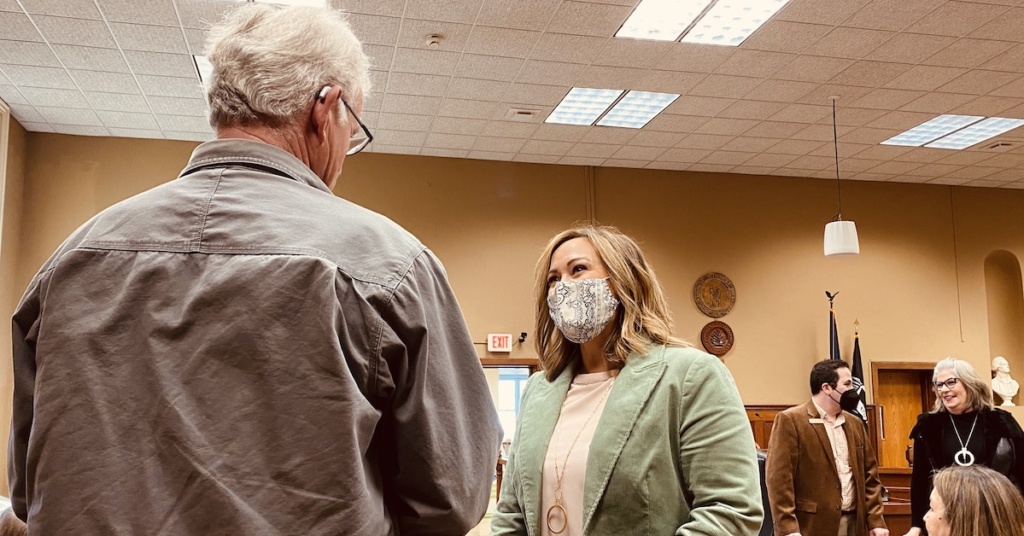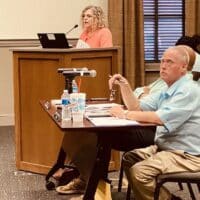Christian County is receiving approximately $2.5 million for water and sewer system improvements and expansions, but rising costs for materials and labor could impact how far local utilities can stretch those dollars.
Lt. Gov. Jacqueline Coleman announced the grants Wednesday during a stop in Hopkinsville.
The money comes from the state’s Cleaner Water Program, which relies on $250 million in American Rescue Plan funding that the General Assembly agreed last year to spend on clean drinking water and wastewater grants.

The local share includes:
- $1.1 million to the Christian County Water District for extension of services to some of the most remote areas of the county.
- $1.1 million the Hopkinsville Water Environment Authority to replace water meters and to expand and improve sewer services.
- $268,835 to the city of Oak Grove for commercial water meter replacements.
Extending the county’s water lines
Ashbel Brunson, who chairs the Christian County Water District Board, said the state grant is a crucial step toward achieving a goal to provide clean drinking water to every household in the county.
Roughly 95% of the county’s rural residences are customers of the water district, while county water lines have not yet reached 60 to 70 households, Brunson told Hoptown Chronicle.
Some of those homes are at the end of remote county roads, where residents still rely on well water or haul water in trucks to their property, he said.
Christian County has been chipping away at the list of homes that don’t have county water for more than 20 years. In 1998, then-Gov. Paul Patton created the Water Resource Development Commission and set a goal to provide safe drinking water to every resident of Kentucky by 2020.
“It is a health issue,” said Brunson, referring to the potential contamination of well water from coal runoff and other factors.
Christian County Water District manager James Owen said the utility wants to extend service to the following roads: Hayes Road, J. Night Road, Root Road, Firetower Road, Pleasant Grove Road, Cerulean Springs Road, Champion Highway, Fentress Lane, Owen West Road, Pruitt Lane, A. Daniel Road and Carneal Lane.
Funding shortfall could prompt ‘drastic cuts’
Owen said the project would run water lines to the entire road for Hayes Road and Root Road, while expansion efforts to the other roads would target homes that have not yet been added to the county water system.
Two years ago, the estimated cost for this county water expansion was $944,354.
“Unfortunately, projects recently bid in other counties have exceeded twice the engineers’ estimates,” Owen said in an email to Hoptown Chronicle after Coleman’s visit. “Should that hold true for our proposed roads, the obligated funds will fall way short and require drastic cuts.”
Local officials have been discussing the potential shortfall with officials in Frankfort.
State officials are considering a plan that would allow utilities like the Christian County Water District to perform some of the work “they are capable of doing themselves to stretch these dollars further,” said Owen. “Our hopes are to provide water service to each road and home which is willing to accept our service.”
A bipartisan effort to support Kentucky’s future
Coleman and Christian County Judge-Executive Steve Tribble, both Democrats, said bipartisan agreements with the Republican-led General Assembly made the grants possible.
The improvements across the state are important for economic development, said Coleman, who announced the local grants at the Christian County Courthouse. Coleman presented large ceremonial checks, and local officials posed for photographs with her.
“We all know that Kentucky’s aging infrastructure cannot support the jobs of the future. So investments in high-speed internet, clean water, roads and bridges, provide a solid foundation for building tomorrow’s economy today,” said Coleman. “These systems can make the difference that business leaders need when they are looking to invest in Kentucky. Modern infrastructure is crucial for economic development. Quality water and sewer systems also make a difference for our families. And it ensures a basic human right for Kentuckians, and that is access to clean drinking water — something that probably many of us take for granted.”
So far, the state has approved $60 million in Clean Water Program projects. Local governments and utilities worked with Area Development Districts to submit their proposals.
Tribble thanked the Pennyrile Area Development District staff for their role in determining how Christian County would seek grants.
“We certainly appreciate the governor’s leadership and the continued commitment to rural Kentucky,” Tribble said. “And I’d like to say that here in this community that we don’t have any trouble working together. We do work across party lines, and we came together to do this.”
The Kentucky Cleaner Water Program allocates grants in three ways, according to a news release from Gov. Andy Beshear’s office. Those are:
- $150 million based on each county’s proportion of the state’s population, with the exception of Jefferson County’s share, which is discounted by 50% based on its high per capita allocation from the federal act. A list of the allocations by county can be found here.
- $50 million is available for utilities to provide drinking water services to unserved, rural customers or to utilities under a federal consent decree. The KIA shall consider social, economic and environmental benefits in determining the allocations.
- $49.9 million is available to supplement a project grant for a project with a cost in excess of a county’s allocation amount and other available grant sources. The social, economic and environmental benefits shall be considered in determining project allocations. KIA will receive $75,000 to administer the grant program.
Jennifer P. Brown is co-founder, publisher and editor of Hoptown Chronicle. You can reach her at editor@hoptownchronicle.org. She spent 30 years as a reporter and editor at the Kentucky New Era. She is a co-chair of the national advisory board to the Institute for Rural Journalism and Community Issues, governing board president for the Kentucky Historical Society, and co-founder of the Kentucky Open Government Coalition.





